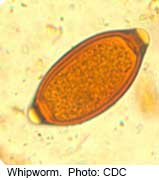- Recognizing the Signs of Hypothyroidism
- 10 Strategies to Overcome Insomnia
- Could Artificial Sweeteners Be Aging the Brain Faster?
- Techniques for Soothing Your Nervous System
- Does the Water in Your House Smell Funny? Here’s Why
- Can a Daily Dose of Apple Cider Vinegar Actually Aid Weight Loss?
- 6 Health Beverages That Can Actually Spike Your Blood Sugar
- Treatment Options for Social Anxiety Disorder
- Understanding the Connection Between Anxiety and Depression
- How Daily Prunes Can Influence Cholesterol and Inflammation
Could a Tiny Worm Help Treat Autism?


Adults with autism who were intentionally infected with a parasitic intestinal worm experienced an improvement in their behavior, researchers say.
After swallowing whipworm eggs for 12 weeks, people with autism became more adaptable and less likely to engage in repetitive actions, said study lead author Dr. Eric Hollander, director of the Autism and Obsessive Compulsive Spectrum Program at Montefiore Medical Center in New York City.
“We found these individuals had less discomfort associated with a deviation in their expectations,” Hollander said. “They were less likely to have a temper tantrum or act out.”
The whipworm study is one of two novel projects Hollander is scheduled to present Thursday at the annual meeting of the American College of Neuropsychopharmacology in Hollywood, Fla.
The other therapy — hot baths for children with autism — also was found to improve symptoms, Hollander said.
Inflammation caused by a hyperactive immune system, which is suspected to contribute to autism, is the link between the two unusual but potentially effective treatments.
Researchers believe the presence of the worms can prompt the body to better regulate its immune response, which reduces the person’s inflammation levels, Hollander said.
Meanwhile, hot baths can fool the body into thinking it’s running a fever, prompting the release of protective anti-inflammatory signals, he believes.
Autism is estimated to affect one in 50 school-aged children in the United States, according to the U.S. Centers for Disease Control and Prevention. People with the developmental disorder have impaired social and communication skills.
Rob Ring, chief science officer of Autism Speaks, said such outside-the-box treatments may seem unusual but can provide important lessons.
“My own general mantra is to be agnostic about where new ideas come from, but religious about data,” Ring said. “It’s important for the field of autism to develop new approaches.”
The whipworm study involved 10 high-functioning adults with autism who ate whipworm eggs for 12 weeks, ingesting about 2,500 eggs every two weeks. They also spent another 12 weeks on an inactive placebo medication.
Unlike deadly whipworms in dogs, these whipworms don’t harm humans, Hollander said. “The whipworm doesn’t reproduce in the gut, and it doesn’t penetrate the intestines, so it doesn’t cause illness in humans,” Hollander said. The gut clears itself of the worms every two weeks, which is why patients had to be retreated.
Use of the worms relates to the “hygiene hypothesis,” which holds that some autoimmune disorders might be caused by a lack of microbes or parasites present in the body during earlier, less hygienic times, Hollander said. These bugs might help regulate the immune response in the human body.
In this case, it was found that the adults receiving the worm treatment became less compulsive and better able to deal with change.
Hollander reported that the main side effect of whipworm therapy, diarrhea, occurred about as often in those taking a placebo, or dummy medication.
The bath study involved 15 children with autism who alternated days soaking in a 102-degree hot tub versus a 98-degree hot tub.
Researchers found that the kids had improved social behaviors on days when they soaked in the 102-degree tub.
The findings verify earlier reports that about one-third of people with autism show an improvement in symptoms when they suffer a fever, the researchers said in background information.
“Parents have said when their child got fevers, they see a marked improvement in autism symptoms,” Ring said. “This has been reported for years. This study is just one angle you can take experimentally to get at whether this is a true response.”
Hollander said he plans to follow up the whipworm study with a larger sample that eventually will contain young patients and lower-functioning adults with autism.
Larger follow-ups are necessary before such treatments can gain acceptance, Ring said.
There is some doubt surrounding the usefulness of the whipworm, which has been investigated as a way of treating other diseases related to the immune system, Ring added.
A major trial testing a whipworm treatment for Crohn’s disease, an inflammatory bowel disease, recently failed, casting a shadow over the worm’s effectiveness as an immune system modulator, he said. The company that co-funded Hollander’s research, Coronado Biosciences, also was behind the Crohn’s study.
“I think it’s still a ways away before we know whether these treatments are going to be effective,” Ring said. “But these findings are helping put us on a road to better understand these effects.”
Data and conclusions presented at meetings are typically considered preliminary until published in a peer-reviewed medical journal.
More information
For more information on whipworms, visit the U.S. Centers for Disease Control and Prevention.
Source: HealthDay
Copyright © 2026 HealthDay. All rights reserved.










